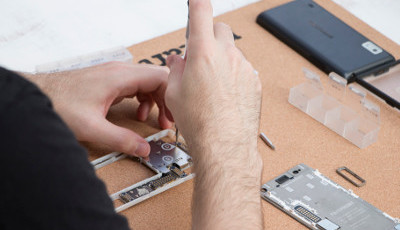Fairphone 2: Fixing Your Phone to Make a Difference
March 08, 2016
on
on

The Fairphone 2 is the first modular phone in the world, received a 10/10 on iFixit and comes with an USB expansion port. Each of these features contribute to the core purpose of the Fairphone project: raising awareness about ethics in electronics by creating a fairer device. In this interview Douwe Schmidt, Community Manager at Fairphone, explains how the design of the Fairphone 2 supports this mission.
The value chain of the electronics industry is a global complex network of activities and processes. In different phases of the value chain there are environmental, social and economic issues such as the use of conflict minerals and violations of labor rights. The Dutch social enterprise Fairphone aims to make the hidden world behind our electronic devices transparent, and to contribute to setting injustices right.
Design
“To make a fairer phone we look at three aspects: the value chain, giving users ownership over their device and waste management”, says Schmidt. “The design of the Fairphone 2 (FP2) lies at the heart of these three aspects. The first Fairphone wasn't designed by the company itself, it was an off-the-shelf device with a few modifications. But the second iteration of the Fairphone is our own design. We chose to do this because it gives us a better understanding of the value chain. We have to find distributors and manufacturers and work with them. That gives us insight in how they operate, and puts us in a better position to influence their processes. In that sense, designing the phone is a starting point.
Another benefit of designing our own product is that it has enabled us to offer a modular phone. The modular architecture enables users to repair their own devices, giving them a sense of ownership. And, lastly, the design contributes to reducing e-waste. We can implement and end-of-life strategy at the beginning of the product life cycle, by designing it in such a way that its constituent components can be more easily disassembled and recycled.”
Conflict minerals
Schmidt: “The Fairphone 1 (FP1) was a white label device, a product made by a company that allows you to buy a batch and put your own name on it”.
The Fairphone project started out as an awareness campaign for the use of conflict minerals in electronics. The four best-known conflict minerals are gold, cassiterite (a source for tin), columbite-tantalite (tantalum) and wolframite (tungsten). They are mined in the eastern part of the Democratic Republic of the Congo, a region devastated by violent conflict. The proceeds from the mines are used to finance armed groups and the miners are often local residents forced to work under dire circumstances. Rather than simply starting an information campaign, the initiators of the Fairphone project decided they would attempt to produce a conflict mineral-free smartphone. A successful crowdfunding campaign confirmed consumers are definitely interested in ethical electronics: they collected 7 million euros in pre-orders.
The value chain of the electronics industry is a global complex network of activities and processes. In different phases of the value chain there are environmental, social and economic issues such as the use of conflict minerals and violations of labor rights. The Dutch social enterprise Fairphone aims to make the hidden world behind our electronic devices transparent, and to contribute to setting injustices right.
Design
“To make a fairer phone we look at three aspects: the value chain, giving users ownership over their device and waste management”, says Schmidt. “The design of the Fairphone 2 (FP2) lies at the heart of these three aspects. The first Fairphone wasn't designed by the company itself, it was an off-the-shelf device with a few modifications. But the second iteration of the Fairphone is our own design. We chose to do this because it gives us a better understanding of the value chain. We have to find distributors and manufacturers and work with them. That gives us insight in how they operate, and puts us in a better position to influence their processes. In that sense, designing the phone is a starting point.
Another benefit of designing our own product is that it has enabled us to offer a modular phone. The modular architecture enables users to repair their own devices, giving them a sense of ownership. And, lastly, the design contributes to reducing e-waste. We can implement and end-of-life strategy at the beginning of the product life cycle, by designing it in such a way that its constituent components can be more easily disassembled and recycled.”
Conflict minerals
Schmidt: “The Fairphone 1 (FP1) was a white label device, a product made by a company that allows you to buy a batch and put your own name on it”.
The Fairphone project started out as an awareness campaign for the use of conflict minerals in electronics. The four best-known conflict minerals are gold, cassiterite (a source for tin), columbite-tantalite (tantalum) and wolframite (tungsten). They are mined in the eastern part of the Democratic Republic of the Congo, a region devastated by violent conflict. The proceeds from the mines are used to finance armed groups and the miners are often local residents forced to work under dire circumstances. Rather than simply starting an information campaign, the initiators of the Fairphone project decided they would attempt to produce a conflict mineral-free smartphone. A successful crowdfunding campaign confirmed consumers are definitely interested in ethical electronics: they collected 7 million euros in pre-orders.
Read full article
Hide full article


Discussion (0 comments)